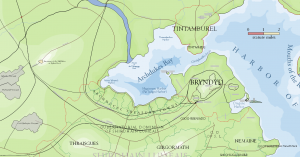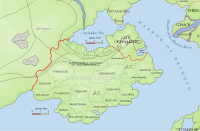Bryndyd
Bryndyd [anglicized pronunciation: /ˈbrɪndɨd/] s the capital of the Archduchy of Asbardy, the seat of the archducal residence and the world-famous Archducal Knights-Draconic of Asbardy. Bryndyd colloquially can mean both the City of Bryndyd which occupies the northeast prominence of the peninsula and Shirdhain Lumeais which includes all the cities of the rest of the peninsula, including the Archducal Treasure Towns. With about seven hundred fifteen thousand inhabitants, Bryndyd is ranked seventh most populous in the old world. Bryndyd is additionally the gubernatorial seat of the Heart-of-Asbardy, the core province of both the Archduchy and the Dominion of Asbardy. Bryndyd is an important gateway city to Asbardy's colonial possessions abroad, including New Pytharnia. In modern Asbardian, Bryndyd is 'Birniadh.' Brŷndyd is the Medibgóëse and Gonfalese version of the name.

Geography and Situation
The city of Bryndyd lies on the northeastern corner of the Shirdhain Lumeais peninsula in the northern portion of the Sea of Asbardy. The site of the city rests to the west, across from the mouth of the Rhaunve River. Rulers of Bryndyd since Kemerite times have taken full advantage of the city's situation to dominate river traffic and thus project their power well into the interior of southern Pytharnia. There are two areas of prominence within the walls of the city making the site ideal to withstand a siege. The neighboring cities of Tintamburel and Tintamfeg rest on a smaller peninsula jutting from the north mainland across the narrow Giraigluadh's Strait which separates Archdukes Bay to the west from the Harbor of Bryndyd to the east.
The coastline of Bryndyd and more especially of the harbor and bay as well as the mouths of the Rhaunve River have changed considerably over the past two thousand years due to the build up of silt from the Rhaunve River and from the Tillaingoggy River.
Economy
The principle industries of modern Bryndyd are textiles, banking, shipbuilding, titancraftworks, shipping, and retail. Bryndyd is a critical point of shipping for southern Pytharnia as it provides access to both the Pallathantic Sea and the Rhaunve River which enables river-barge access to Amyrn through the Durrhaunve Valley.
Municipal Government
Culture and Festivals
Key Sites
For a list of sites, please see the above article.
Transportation and Infrastructure
- City Dragonrail
- Inner Shore Barge Lines
- Aerobarge Lines, Aerobarge Platforms
- Skybistros
- Streetcar Houses and Streetcar Lines
- Coach Companies
Institutions of Learning
Archcollege of Bryndyd
Archguild School of Bryndyd
Arathracian Gymnasium of St. Agostof
Arathracian Gymnasium of St. Erithragal the Restorer
Museum of High Antiquaries of Bryndyd
Archducal Archives of Bryndyd
History
Bryndyd is one of several ancient giant cities, that is, cities founded in very ancient times by the Kemerite Giants and subsequently ruled by Neptultchi and Moigthe. Bryndyd is favorably poised in the north of the Sea of Asbardy, facing the mouths of the Rhaunve River which it historically has controlled. Bryndyd was first called 'Bambashathra' by the giants as reported in Kalaman records and then called 'Neptulxapxi' by the Tuadbe survivors of the Neptultchi Civilization. The Moigthe tribes of southwestern Pytharnia who occupied the site called it 'Birniadd' which has been translated into English as 'Bryndyd.' The year when Bryndyd, or rather ancient Bambashathra, was founded is unknown and some Kemerite legends ascribe its origin to before the Flood of Aturyanda. The spelling 'Bryndyd' is taken from the Medibgóëse spelling of the city, 'Brŷndyd'.
The ancient Kemerite giants established the settlement of Bambashathra, perhaps as late as the sixth millennium before Salmakhamer. The giants dominated the peninsula and used it as a base to control the commerce of the Rhaunve River. Trade existed between and Bryndyd and gigantine Amyrn. Kemerite rule of Bambashathra ended around 4300 AS with the Coming of the Neptultchi who landed near Bryndyd and conquered the Kemerite giants.
Legends report that the Coming of the Neptultchi brought about the landing of their great shell city off the shore of Bryndyd and the Dragon Folk soon defeated the giants in battle. Their princes and chieftains invaded the city and began their conquest of southern Pytharnia, all in the late fifth millennium before Salmakhamer.
In the late Tuadbe Period before the collapse of the Neptultchi God-Empire, desire for conquest and piratical activities in the Pallathantic Sea based in Bryndyd as well as other coastal cities, brought the Neptultchi into prolonged conflict and war with the rulers of ancient Kalama.
The migrations of the people who would eventually became the ancestors of the ancient Moigthe brought them from Asdauria by migration and barges to the shore of Ambrulia and eventually into all of southern Pytharnia. These tribes are believed to have reached the site of Bryndyd around 1400 AS.
In 1984 AI, the Chaos Fleet landed and sojourned for some time at Bryndyd.
Bryndyd became an important center of textiles and embroidery during the Middle Ages. The Tintamburel Tapestry is considered a great example of the high development of the textiles arts in Asbardy.
The defeat of Bexaloth Archmage of the Infinite Elements of Eternal Chaos, who had ruled about 111 years from 2191 to 2302 , in the Seventh Isbajath marked the end of the Middle Ages of Chaos for Bryndyd and its entry into the earliest modern times.
Bryndyd already a world-class city received additional prestige by hosting the Congress of Bryndyd at the Basilica of Saint Treel. Bryndyd was chosen as an acceptable location for both Arathracian and non-Arathracian rulers of the Pallathantic Region. The Congress of Bryndyd was a formative event that led to the present-day modern world of politics. Numerous rulers and newly created states sent diplomats and delegations to the Congress.
Modern Bryndyd
Bryndyd is the capital of Asbardy, a major Pallathantic country and colonial power. Bryndyd is an important textile center. During the Middle Ages of Chaos, Bryndyd became famous throughout the Pallathantic Region as a center of fine embroidery. In the twenty seventh century (2600's), numerous titancraft textile factories were built in the city which established Bryndyd as a world textile producer. The city is also an important emporium for the exportation of numerous fine wines and table wines from Asbardy. Bryndyd is a leader in titancraft production and development.
Shirdhain Lumeais

Shirdhain Lumeais is a special tertiary political level division within the Province of Heart-of-Asbardy which is part of the Dominion of Asbardy. Shirdhain Lumeais is a large peninsula comprised of numerous cities. Territory not enclosed in a town is directly part of the Gubernatorial Dominion of Shirdhain Lumeais. Shirdhain Lumeais more or less includes all territory in the peninsula that is not part of Bryndyd. Shirdhain Lumeais enjoys certain tax benefits. The Archducal Treasure Towns are also part of Shirdhain Lumeais and enjoy an even more favorable tax status. The Archduke with the approval of the Diet appoints the governor of the Shirdhain Lumeais. The governor appoints a superintendent to oversee the collection and enforcement of the revenues of the Archducal Treasure Towns.
Map Resources
- PDFs
See Also
- Archduchy of Asbardy
- Asbardy
- Chronology of Bryndyd
- City of Dragons (Bryndyd)
- Festivals and Observances of Bryndyd
- Heart-of-Asbardy
- History of Bryndyd
- List of Buildings and Sites in Bryndyd
- Shirdhain Lumeais
| This article is a stub. It requires further development by the creator. |